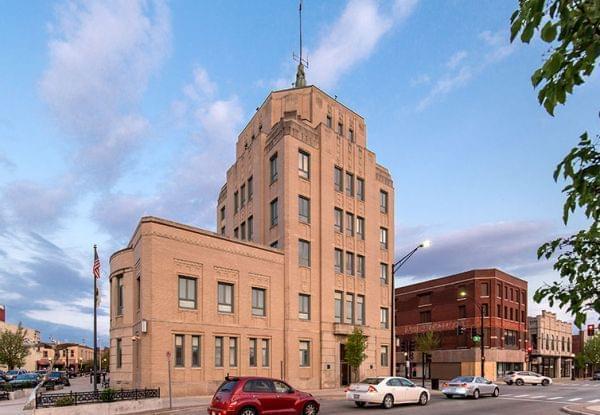Immigration Agency Seeks Local Permission To Continue Refugee Resettlement

The Champaign City Building, where the Champaign City Council will discuss giving formal consent to allow a refugee resettlement. Travis Stansel/Illinois Public Media
The Champaign City Council will vote Tuesday evening on a resolution allowing a local agency to continue its work with refugees, in keeping with a recent executive order from the White House.
The resolution grants formal permission for the Refugee Center to continue resettling refugees in Champaign, under a program it operates through the U.S. Conference of Catholic Bishops. Most of the refugee families are fleeing violent conditions in Central America. Priority is given to reunited refugees with family members or friends who are already living in the U.S.
An executive order signed by President Trump in September requires that state and local governments give their consent, in writing, to the resettlement of refugees within their borders. The order says consent should be sought, “not only to identify the best environments for refugees, but also to be respectful of those communities that may not be able to accommodate refugee resettlement”.
The state's consent was given by Governor JB Pritzker, in a letter to Secretary of State Mike Pompeo that was released to the public on Tuesday.
As for the consent from local governments, Refugee Center executive director Lisa Wilson says she has contacted officials in all the areas where refugees from her agency’s remote resettlement program have gone to live.
“I sent my letter out to Mayor (Diane) Marlin of Urbana, Mayor (Deb) Feinen of Champaign, the mayor in Savoy, the mayor of Rantoul,” said Wilson. “And I also sent to County Executive Darlene Kloeppel, just to cover all of my bases.”
Wilson says Mayor Marlin, as Urbana’s chief executive, has already given her consent. In Champaign, the city council is making the decision, in keeping with the city’s council-manager form of government. Wilson says she has not yet heard from the other three local governments. But she says the U.S. Conference of Catholic Bishops has asked the Refugee Center and other organizations it works with to get the consent of local governments by the end of the year.
The Champaign resolution cites the city’s vision statement describing Champaign as “an inclusive community that welcomes all”, and goes on to say that the city council “provides its formal written consent to the operations of refugee resettlement programs as authorized by the United States Department of State”. Upon passage, a copy of the resolution will be sent to the State Department.
Wilson says in addition, the Trump administration has cut sharply the number of resettlements allowed per year, down to 18,000 families nationwide, compared to more than 100,000 during the Obama administration.
“If 18,000 remains the limit, I don't think we'll see any true refugee families at all,” said Wilson, referring to the Refugee Center’s fiscal year 2020, which began July 1st.
For FY 2019, the federal government had set its national refugee limit at 40,000 families. Even then, Wilson said that out of 469 families that the Refugee Center worked with last year, only one came into the U.S. under the refugee remote settlement program. She explained that the program is separate from the Special Immigrant Visa program, which the Refugee Center has used to resettle people from Afghanistan, who had worked with U.S. Armed Forces as translators or interpreters. But Wilson said constraints on immigration are being placed in many areas besides the refugee program.
“We’re seeing an attack on immigration from every conceivable avenue,” said Wilson, “whether it’s raising fees for legal immigration, reducing the number of permitted refugees coming into the country, and of course, the crisis that we’re seeing at the border with the inhumane treatment of families that are being separated and being kept in terrible conditions.”
Wilson says she expects the Champaign City Council to pass the resolution granting them permission to resettle refugees in the city. She says leaders in Illinois, from Governor Pritzker to local officials, have been welcoming to immigrants.
“But there absolutely is anticipated that there are some areas of the country where that permission will not be granted, and that will definitely affect the operations of refugee organizations in those areas,” said Wilson.
The Refugee Center was founded in 1980 by a group of Vietnamese refugees. The Champaign-based organization changed its name earlier this year from the East Central Illinois Refugee Mutual Assistance Center.
(UPDATE: This article was updated to note Gov. Pritzker's formal consent for resettlement efforts in Illinois. - JM 12/17/19)
Follow Jim Meadows on Twitter @WILLJim Meadows
Links
- Refugees Help Bridge Healthcare Gap In Their Communities
- Why Getting Mental Health Care Can Be A Struggle For Refugees
- Illinois Attorney General Issues Statement Condemning Refugee Ban
- Illinois Issues: Refugees Seek A Haven In Troubled Times
- Syrian Refugees Knocking on the Door
- Refugee Center website

